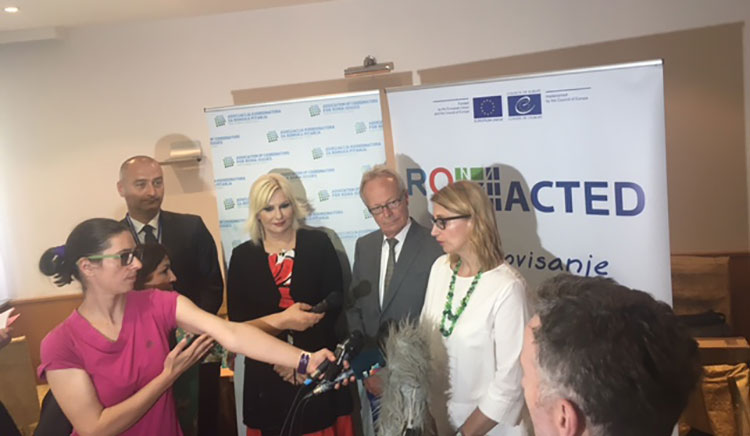A joint program of the Council of Europe and the European Commission ROMACTED: Promotion of good governance and the strengthening of Roma community at the local level, was presented in Belgrade.
This program is focused on building up of political will and sustainable policies through engagement of local governments in enhancement of democratic public administration and strengthening of Roma community.
At the opening of the conference Deputy Prime Minister and the chair of the Coordination Body for Monitoring of the Implementation of the Strategy for Roma Inclusion (2016-2025) Zorana Mihajlović said that it is very important to carry out what has already been done at the state level, like the establishment of strategies and action plans, on to the local self-governance level, and that the task for the 11 local self-governments participating in this program is to show the other local self-governments the need for showing the Roma people they can achieve their rights and interests.
Mihajlović stated that, in the previous period, the government has established a clear political will to deal with the Roma issue and said that every Serbian citizen should live a decent, sustainable life.
“We want everyone to have equal rights, not just as a proclamation and legislation, but also in practice. There is a lot of inequality and a lot of problems, this is why it is our task to sort that out,” said Mihajlović adding that the connection between the state, the Coordination Body and local self-government units is also important and that without it there can be no progress.
She reminded the gathering that, in the previous period, the government has set certain frameworks for the inclusion of Roma people, not just through legislation but also through setting aside funds to that end.
She further added that there were still things that have not been done and said they would be tackled in the next period with the help of the Council of Europe.
“I invite you to use even more the (resources of) the government and the Coordination Body and that, together, we do our utmost so that the Roma people could state their interests and achieve their rights,” said Mihajlović speaking to the gathered representatives of the 11 local self-governments.
Head of the Council of Europe Office in Belgrade, Tim Cartwright, said that this project was very important because it has encouraged good governance at the local level within European communities.
“The project is very important because it includes not only members of the Roma community, but also representatives of 11 local self-governments with whom they will cooperate on carrying out the pilot project,” Cartwright said.
Deputy Head of the EU Delegation to Serbia, Mateja Norčič Stamčar, said that Roma people are the largest, but also the most discriminated against and marginalized ethnic minority in Europe.
“They are at greater risk of poverty and social exclusion then the rest of Europeans. The importance of this matter is growing. The focus for EU member states until 2020 is the application of the strategic frameworks for inclusion of Roma people, but there are already talks in Brussels about priorities beyond that period,” said Stamcar.
She stated that the issue of social inclusion of Roma is of special importance to Serbia’s accession to EU and added that EU support of Serbian efforts in this regard is also financial, and that, currently, EUR 11,4 million are dedicated to Roma inclusion projects, but that the plan is to invest a further EUR 20 million.
The city of Niš is a good example of good governance that contributes to the strengthening of the Roma community. Members of the Roma community are actively participating in the construction of the apartments for 110 Roma families, due for completion in a year’s time, the Mayor of Niš, Darko Bulatović, informed the gathering.
The task of the local self-governments that have joined the regional program is to show the rest of the local self-governments how to create the conditions for Roma to achieve their rights.
“The National Council of Roma Minority in Serbia’s opinion is that a more intensive cooperation between local governments and local Roma communities is a foundation for the essence of the establishment of full equality and integration for the members of the Roma nationality,” said the president of the National Council of Roma, Tefik Ramadanović.
After the conference was open a Protocol on Cooperation Between the Ministry of Construction, Transport and Infrastructure, 11 local self-governments –Kragujevac, Niš, Odžaci, Kostolac, Prokuplje, Smederevo, Subotica, Vranje, Vrnjačka Banja, Zaječar and Zvezdara and the Council of Europe was signed.




